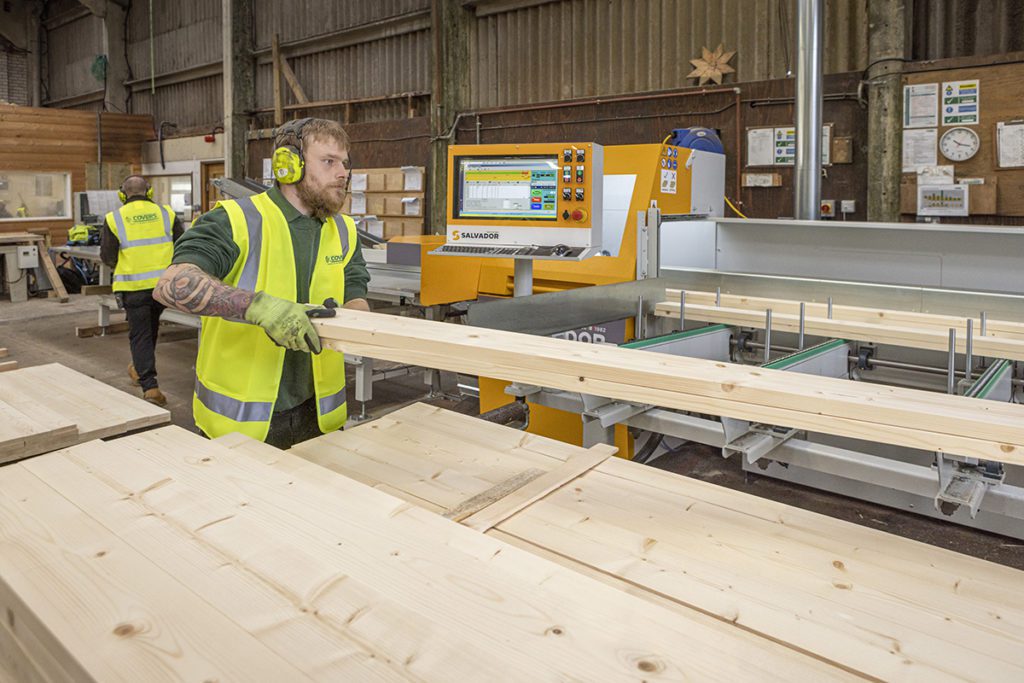For the first time, our full range of Salvador Crosscut Saws will be available at our Nottingham showroom and in this latest blog, we take a deep dive into everything you need to know about our models and what they will bring to your business…
In September 2022, Daltons Wadkin’s full range of Salvador Crosscut Saws will be available at our Nottingham showroom.
As the sole agents for Salvador in the UK and Ireland for many years now, our relationship with Salvador is one we are proud of and we’re excited to be able to show off our full range in all its glory – particularly at the Wood & Panel Machinery Show that we will be hosting on our premises between 4th and 6th October.
To mark the occasion, we have pulled together this guide on everything you need to know about our range of Salvador Crosscut Saws and why they continue to prove so popular with our customers…
Firstly, what is a crosscut saw and what is it used for?
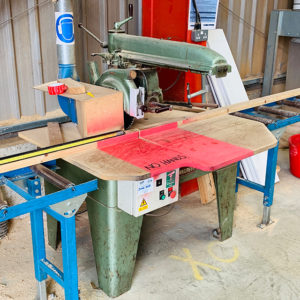
The term “crosscut saw” can be applied to a number of machine types including radial arm saws, chops saws, automatic programmable saws and even hand saws. Some models may feature a tilting head or an arm that can be angled for bevel and compound cutting. The common feature is that they are designed to cut across the grain of timber, hence crosscut.
Traditional radial arm crosscut saws feature an overhead arm with a saw carriage running beneath. A handle allows the operator to manually pull the saw towards him, cutting the timber beneath. Chop saws work on a similar principle but rather than a radial movement, operate on a pivoted swing motion.
The size and capacity of crosscut saws can vary greatly. Depending on the type of work being carried out, whether it be fine woodworking, sawmilling applications or site joinery.
What is the difference between manual, fully-automatic and semi-automatic cross saws?
The main difference is the way in which they operate. A manual machine relies on the operator to provide the cutting motion, physically pulling the blade through the workpiece. Repetitive volume cutting can quickly become fatiguing for the operator leading to mistakes in accuracy or accidents.
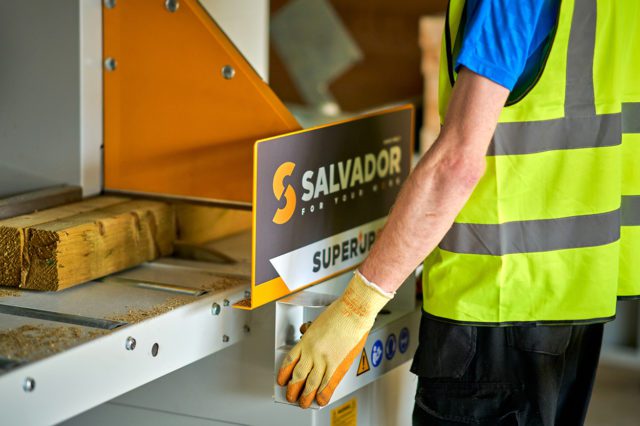
On a semi-automatic crosscut saw, the cutting motion is automatic, but the triggering of the saw cycle and positioning of the timber is manual. To trigger the cutting cycle, the operator must press two separate buttons, one with each hand, ensuring fingers are well away from the cutting line. A clamp descends securing the workpiece from above before the blade rises up from beneath the worktable making the cut. Once the cut is made, the saw retracts under the table and the operator can reposition the workpiece for the next cut and process is repeated.
Fully automatic crosscut saws are designed for processing large volumes of material and the entire cutting process is automated. A cutting list is programmed into the machine either remotely from the office or directly at the machine. The operator then loads a length (or stacked pack) of timber on the infeed table and presses “Start” triggering the automatic cutting cycle. First, the pusher arm scans the length of material on the infeed table, looks at the cutting list and decides the best combination of pieces to cut to minimise waste and maximise yield. The pusher arm then feeds the material into the saw, positioning it precisely for cutting. After each cut, the material is repositioned. All this happens with no input from the operator. The cutting motion is similar to semi-automatic machines, cutting from the bottom up. While the machine is cutting, the operator can be removing the finished work pieces from the outfeed table.
What is optimisation?
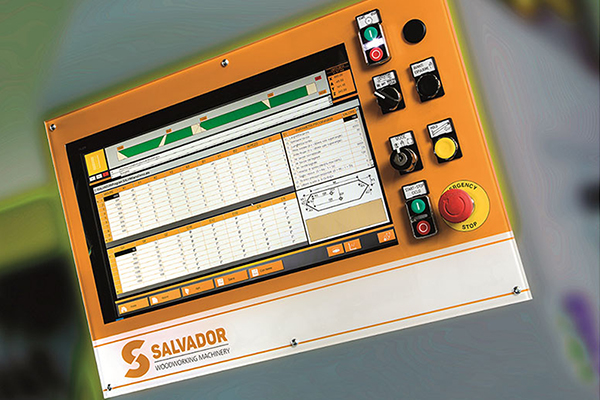
A feature of some automatic crosscut saws, cutting list optimisation is carried out by the machine “brain”. A cutting list is entered into the machine defining the required output required in terms of workpiece length. The operator is only then required to load the machine with full lengths of timber. The machine scans the material length and refers back to the cutting list to see what best combination of pieces it can obtain while minimising any waste.
Salvador automatic saws benefit from full Windows PC control. Running powerful optimising software, cutting lists are continually analysed to give maximum material yield for each individual length of timber cut. Residual off cuts can then be ‘shattered’ for secondary processing and removed from the production line through an optional waste trap door.
What is defecting?
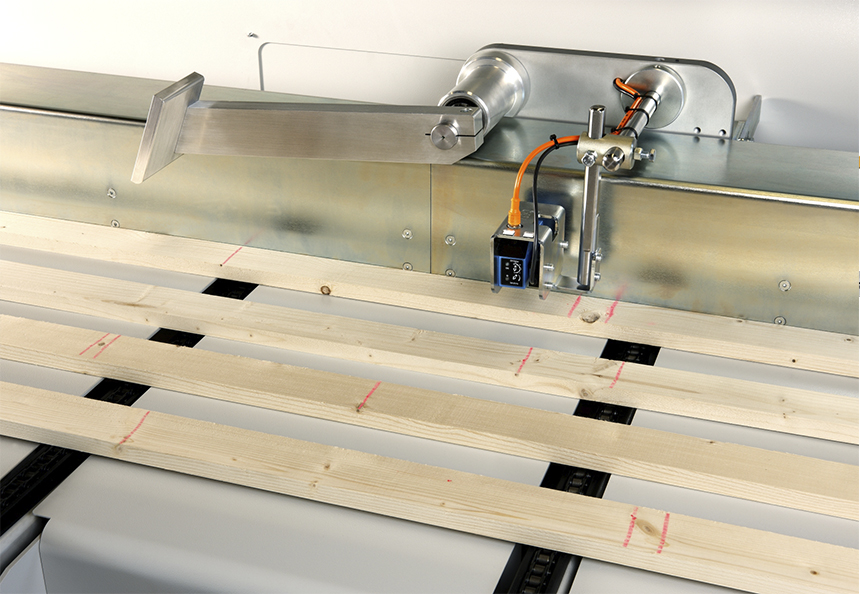
![]() Operators can decide which parts of a timber length are acceptable and which are not. Using a fluorescent pen, operators mark knots, shakes or other unwanted imperfections which don’t meet production standards. Salvador’s defecting facility looks for the fluorescent marks and takes these into account when optimising the cutting list. In a similar method, entire lengths of timber can be graded from 1 to 5 with each grade having its own separate cutting list.
Operators can decide which parts of a timber length are acceptable and which are not. Using a fluorescent pen, operators mark knots, shakes or other unwanted imperfections which don’t meet production standards. Salvador’s defecting facility looks for the fluorescent marks and takes these into account when optimising the cutting list. In a similar method, entire lengths of timber can be graded from 1 to 5 with each grade having its own separate cutting list.
Who are Salvador and what do they do?
Founded in 1981, Salvador is a leading Italian manufacturer of robust, reliable, precision semi-automatic and fully automatic crosscut saws. Their range of saws is diverse and they’re utilised in all sorts of industries for cross-cutting a range of materials. With over 3000 machines sold to over 50 countries worldwide, they are a true specialist in their field.
What industries are crosscut saws used in?
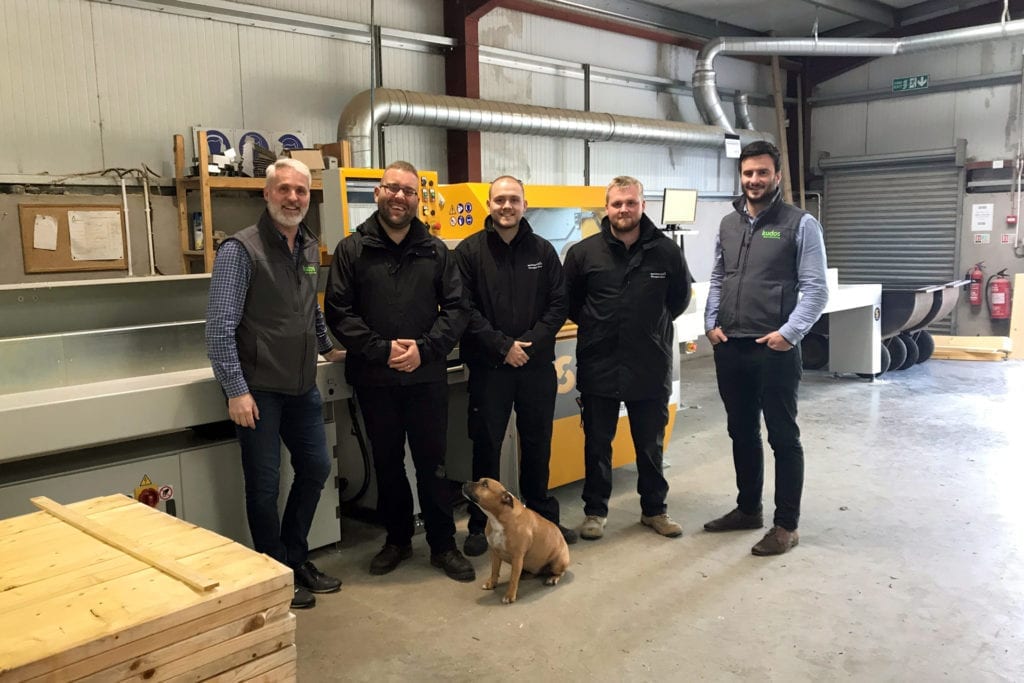
Typically, Salvador Crosscut Saws are used across the following manufacturing industries:
- Furniture
- Doors and windows
- Pallets and cases
- Timber framed buildings
- Flooring and parquet
- Stairs and joinery
- Garden buildings
- Sofas and beds
At Daltons Wadkin, we have also been putting an increasing number of these saws into people working with recycled eco-plastic, which is compressed and produced into long lengths of product which can be machined in a similar fashion to wood-based materials.
Again, you might see these as decking, at bus stops, and park benches. They may look like they are made out of wood but on closer inspection, they are recycled plastic.
What are the different types of Salvador crosscut saws available at Daltons Wadkin?
We have always showcased our Salvador Cross Cut range in our Nottingham showroom but we’ve taken the decision more recently to create a dedicated area for them in order to showcase the entire range.
Below, is your one-stop-shop on all Salvador machine models, how they differ, and what our Managing Director, Alex Dalton, thinks of them…
Salvador SuperPush200
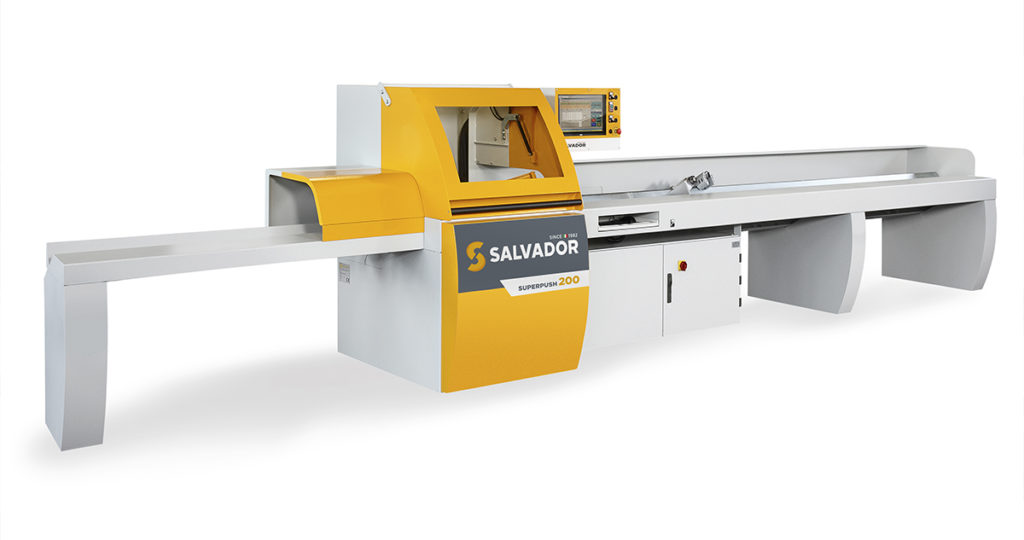
To fully exploit the advantages of Salvador technology, only a fully automatic saw will do. The SuperPush 200 can increase yield by 15% or more, reduce labour by over 50%, reduce operator skill level, increase productivity, reduce costs and provide a safe working environment. A choice of outfeed systems can further automate the sorting of cut stock and waste offcut removal.
The key features you need to know about:
-
-
- Straight 90 degree cutting
- Programmable cutting lists with automatic cutting cycle
- Optimisation and defecting as standard
- Efficient and accurate production
- The ability to automatically measure materials
- A clear and intuitive graphical operator interface
- Seamless remote machine monitoring and assistance
-
What Alex says about this machine:
“This is the most popular model for the UK market and lends itself to so many industries. We can provide countless testimonials where the installation of a SuperPush 200 had replaced 4 or 5 manual crosscut saws, boosted accuracy, slashed staff costs and provided a safe operating procedure.”
Find out more about the Salvador SuperPush 200Salvador SuperAngle 600
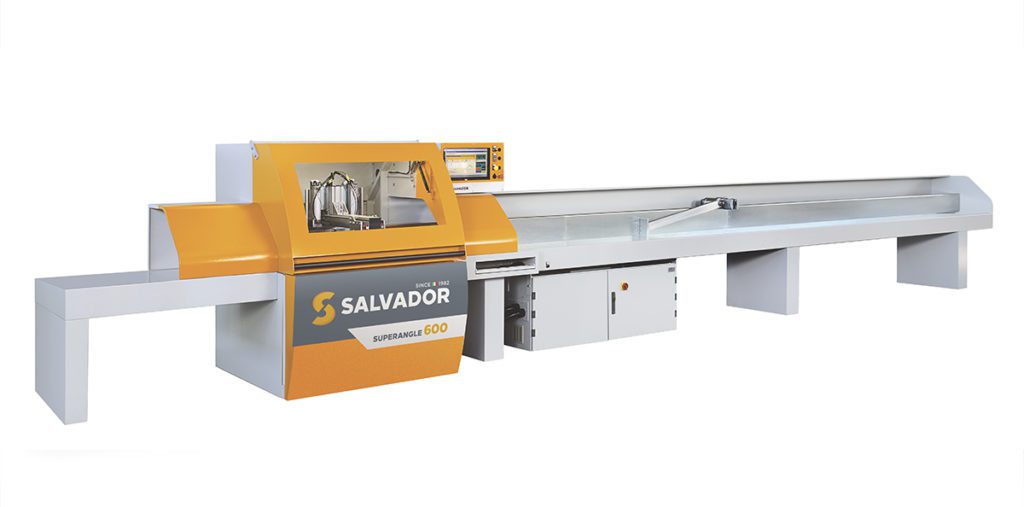
Angle cutting offers the largest potential for waste reduction and material optimisation. Capable of straight and angle cutting up to (+/-) 75° the SuperAngle 600 not only optimises the cutting list by length, but also by angle, flipping pieces if necessary, and nesting angles to further reduce waste. Chain-fed infeed system and independent drilling units are increasingly popular options.
The key features you need to know about:
-
-
- Angle cutting up to (+/-) 75°
- Optimisation and defecting as standard
- High-speed positioning between cuts
- Unique clamping system
- A clear and intuitive graphical operator interface
- Choice of infeed and outfeed table options
-
What Alex says about this machine:
“Again, a very popular model for the UK market, especially amongst manufacturers of timber-framed buildings, sheds, fencing etc. The SuperAngle 600 trumps the competition with its speed, accuracy and ease of use.”
Find out more about the Salvador SuperAngle 600Salvador SuperPush 250
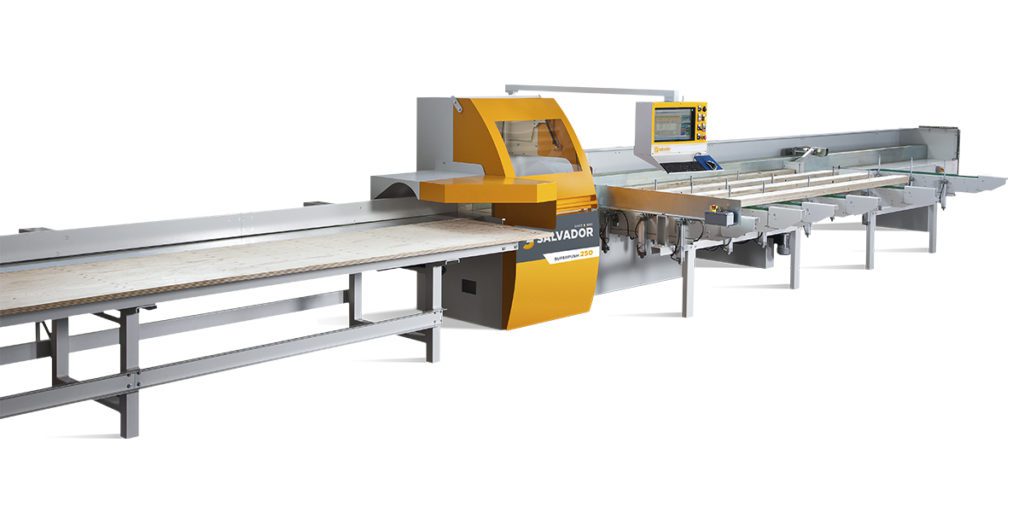
Capable of processing up to 130 cubic metres of timber per shift, the SuperPush 250 is a chain fed monster! Up to 7 loading chains allow the machine to be continually fed with individual or stacked workpieces for uninterrupted production. Direct inkjet printing options are available to keep track of finished stock.
With this machine, you will have the ability to regulate the pusher speed within each cutting list, reaching a maximum speed of 120 m/min and scanning speed up to 195 m/min as an option.
The key features you need to know about:
-
-
- Chain fed for high production cutting
- Straight 90 degree cutting
- Optimisation and defecting as standard
- High-speed pusher up to 120m/min
- Timber scanning speed up to 195 m/min
- A clear and intuitive graphical operator interface
- Choice of infeed and outfeed table options
-
What Alex says about this machine:
“We just love this machine. You have to see it in the flesh to get a proper sense of the heavy-duty build quality. Its ability to churn out huge volumes is immediately obvious when you see it. Pallet and case manufacturers are particularly keen on this model, replacing old-style block cutters with a SuperPush 250 that can do so much more.”
Find out more about the Salvador SuperPush 250Salvador SuperUp 500
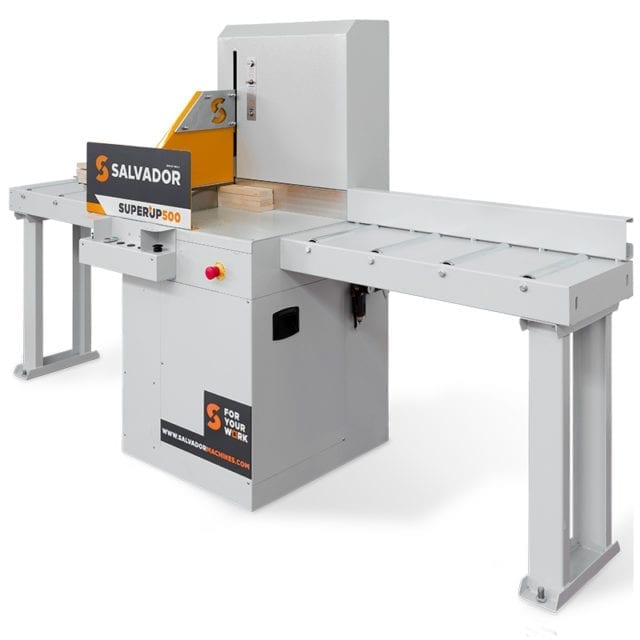
Brought to market in 2021, the high-powered Salvador SuperUp is a semi-automatic crosscut that replaced the previous generation of Classic saws with a stronger design and vastly improved accessibility for maintenance and blade changing. Blade capacities of 500, 550 and 600mm are available with increased cutting capacity. It can be further customised with a choice of infeed and outfeed roller tables and stop systems.
The key features you need to know about:
-
-
- Safe, two-handed operation
- ‘Up-stroke’ saw movement
- Easy pneumatic regulation of saw stroke and clamping pressure
- Optional retracting front saw guard for ergonomic working
- Heavy-duty construction
- Compact size with a choice of infeed and outfeed table lengths
- A high-powered, high-speed saw unit for clean crosscutting
- Can be combined with a programmable stop system for further production gains
-
What Alex says about this machine:
“This model is replacing traditional radial arm crosscut saws as a safer and quicker alternative for straight 90-degree crosscutting. Customers love the simplicity, being able to regulate the cutting speed and clamping pressure from the front of the machine.”
Find out more about the Salvador SuperUpSalvador SuperUp 600
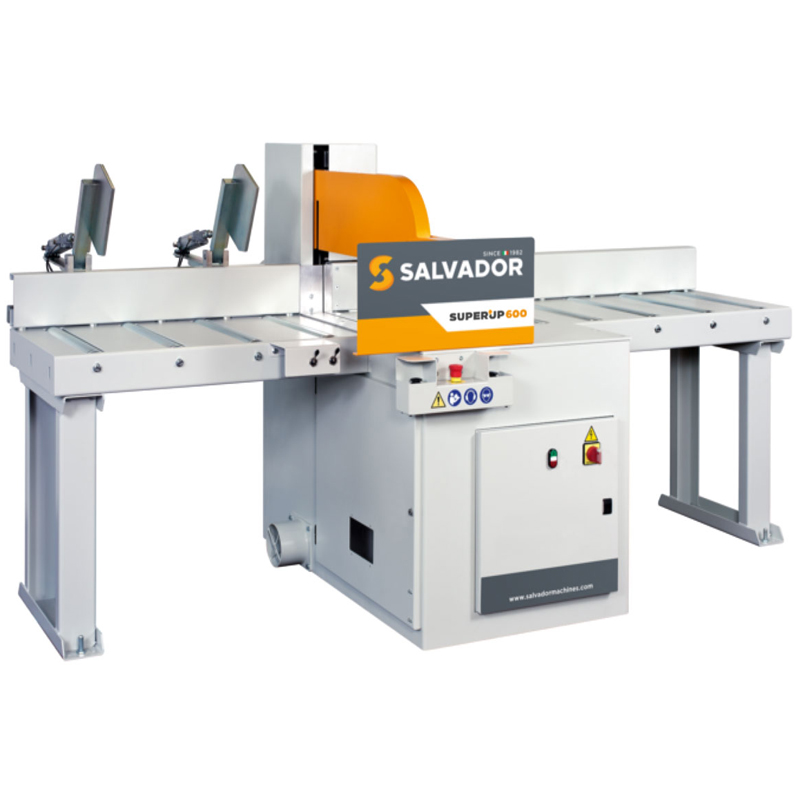
A sensational machine, the SuperUp 600 model stands out for having the largest cutting capacity of all the semi-automatic Salvador crosscut saws as well as coming with all the benefits of the Salvador SuperUp. The 600mm dia blade capacity allows cutting up to 420mm deep and 610mm wide thanks to the pendulum motion of the saw.
The key features you need to know about:
-
-
- Pendulum saw motion for maximum cutting capacity
- ‘Up-stroke’ saw movement
- Easy pneumatic regulation of saw stroke and clamping pressure
- Optional retracting front saw guard for ergonomic working
- Heavy-duty construction
- Compact in size with a choice of infeed and outfeed table lengths
- A high-powered, high-speed saw unit for clean crosscutting
- Can be combined with a programmable stop system for further production gains
-
What Alex says about this machine:
“This is not a model we sell in high volumes, but when a customer needs oversized cutting capacity the SuperUp 600 is ideal.”
Find out more about the Salvador SuperUp 600Salvador SuperPush 150
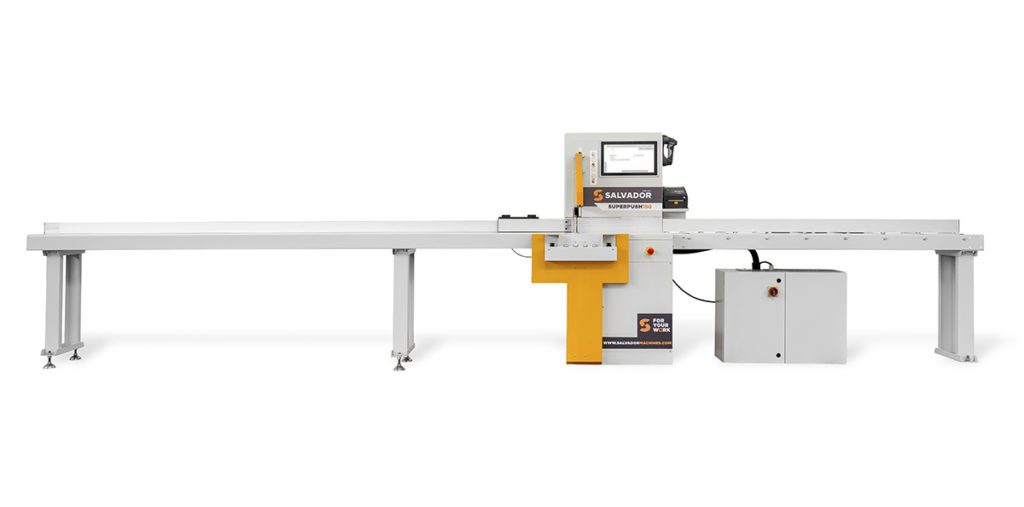
What can only be described as an evolution in crosscutting, the Salvador SuperPush 150 combines the compact form factor of a manual machine with the programmable power of an automatic optimising crosscut saw. This machine stands out for its competitive pricing and customisable specifications, meaning any business carrying out crosscutting can take advantage of a reduction in labour costs and waste output, but also an increase in productivity and accuracy.
The key features you need to know about:
-
-
- Programmable cutting lists and optimisation
- Auto saw cycle
- Servo-driven stop system
- High powered saw unit for clean crosscutting
- Easy regulation of saw stroke speed to adapt to different materials
-
What Alex says about this machine:
“Salvador has developed the SuperPush 150 to bridge the gap between fully automatic and semi-automatic crosscut saws. Combining a programmable stop system with cutting list optimisation with a compact semi-automatic saw unit allows smaller joinery firms to benefit from Salvador cutting technology.”
Find out more about the Salvador SuperPush 150Salvador SuperCut (100/300/500)
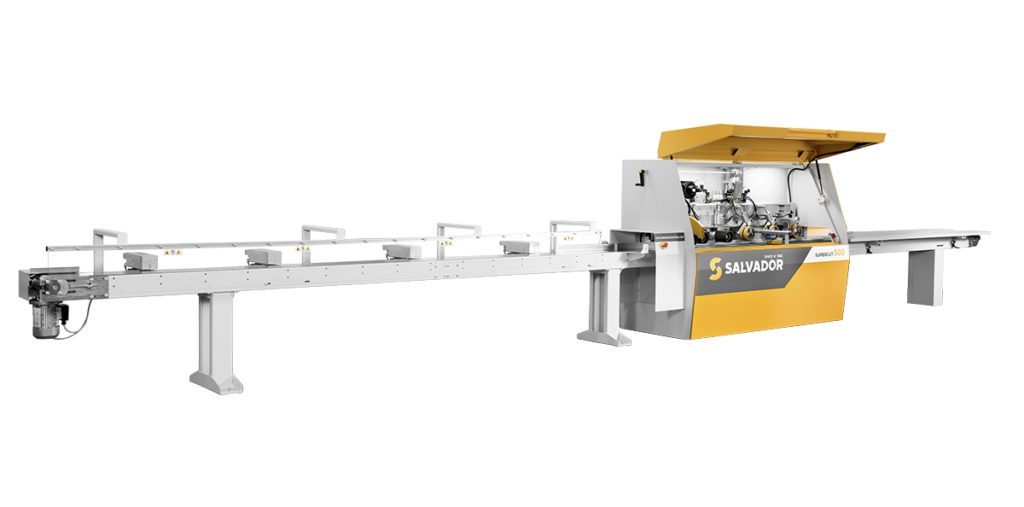
Available in three different sizes to suit your requirements, the Salvador SuperCut 100/ 300/ 500 automatic programmable crosscut uses a conveyor-fed system for feeding single pieces one at a time. With feed speeds up to 240 m/min the SuperCut is built for high volume defecting and optimisation of standard or random timber lengths.
The key features you need to know about:
-
-
- A standout machine for both efficient and accurate production
- High speed single piece feeding
- Intelligent clamping
- Available in three different sizes with feed speeds from 100 – 240 m/min
- Can be incorporated into existing production lines
-
What Alex says about this machine:
“The cutting speed on this machine is insane. You really need a slow-motion camera to capture the sawing in action.”
Find out more about the Salvador SuperCutDoes Daltons Wadkin offer training and installation support for businesses?
Absolutely! As with all our products, we offer full training and installation packages on them just to help people and businesses get the most out of their investment and to make sure the machines are looked after as well. It’s a service that goes hand-in-hand with the purchase.
What our customers are saying
Don’t take our word for it. We can provide countless references from happy customers across a range of industries. Here are just a few to get you started…
“Your hands are nowhere near the blade, not once have I ever felt unsafe.”
Luke Laybourne Machine Operator DWB Timber Engineering
“I turned to Russell and said that’s amazing, it was just a game changer.”
Simon Pask Manufacturing Manager I Like Sheds
“One of the main benefits is the time saved for optimising and minimising the waste.”
Malcolm Baird Fabrications Director Bairds Windows
“It’s the best machine we’ve got, without a doubt.”
John Hudson, Production Manager at Bayram Timber
Summary
The Salvador range of crosscuts is the leading brand in the UK and with our vast range of machines available, Daltons Wadkin has got one that is perfect for your operational requirements – no matter how big or small they may be.
Do you need help? Call our team on 0115 9686 5201 for friendly expert advice or reach out to us by using our contact form. Alternatively, why not see them in action for yourself, with the full range now available at our Nottingham-based showroom.

